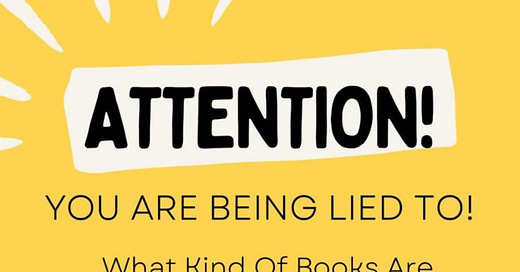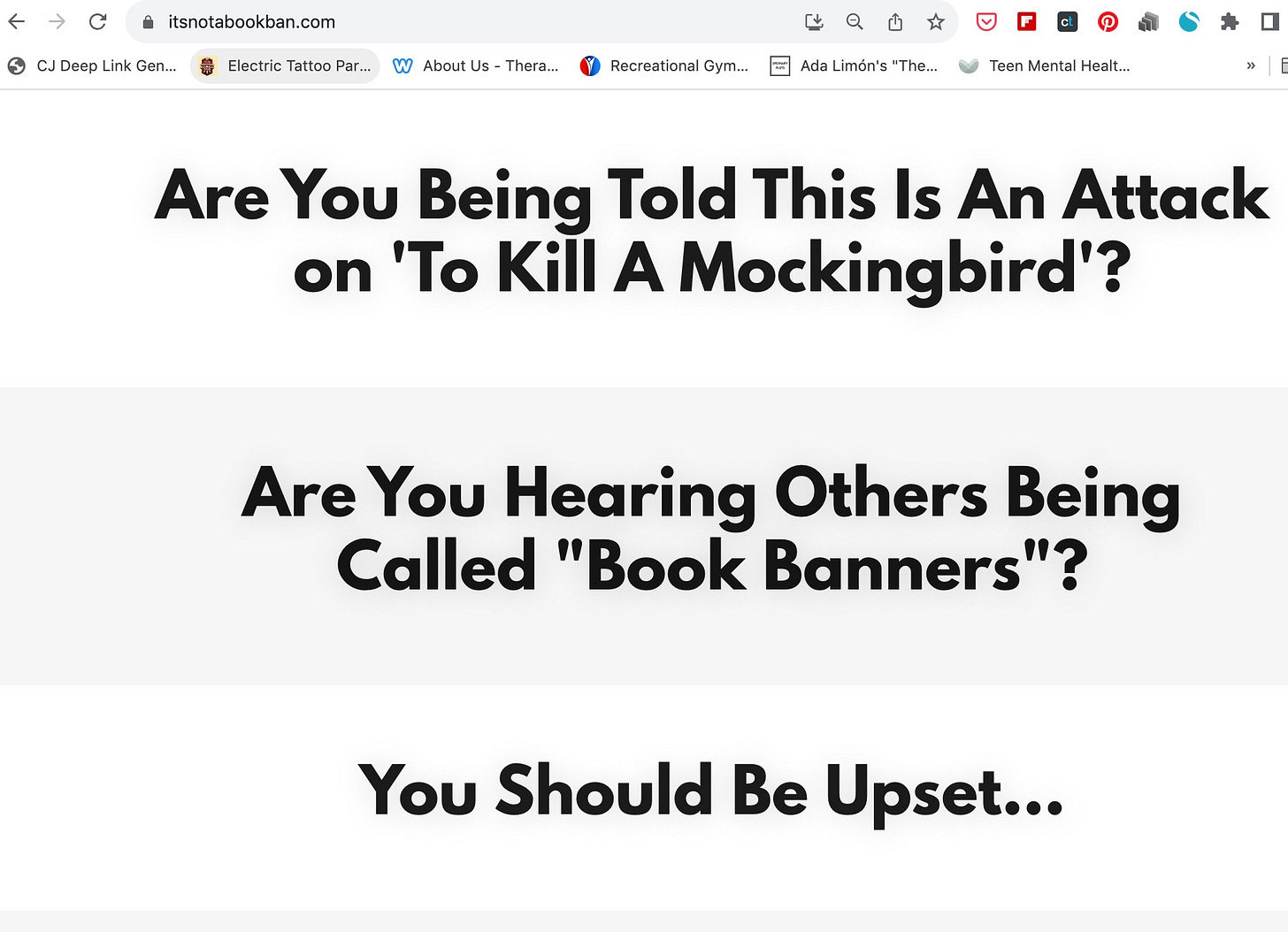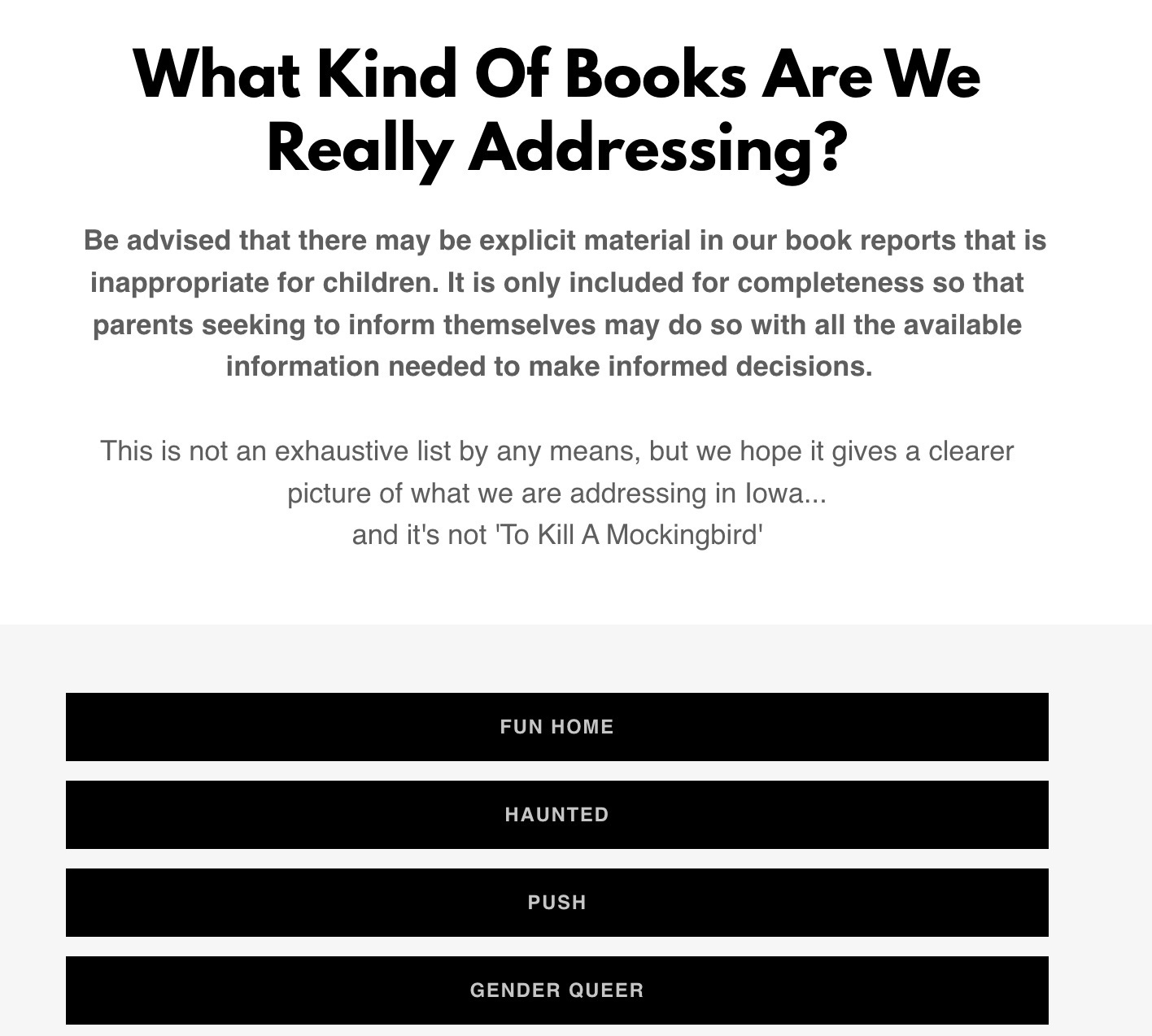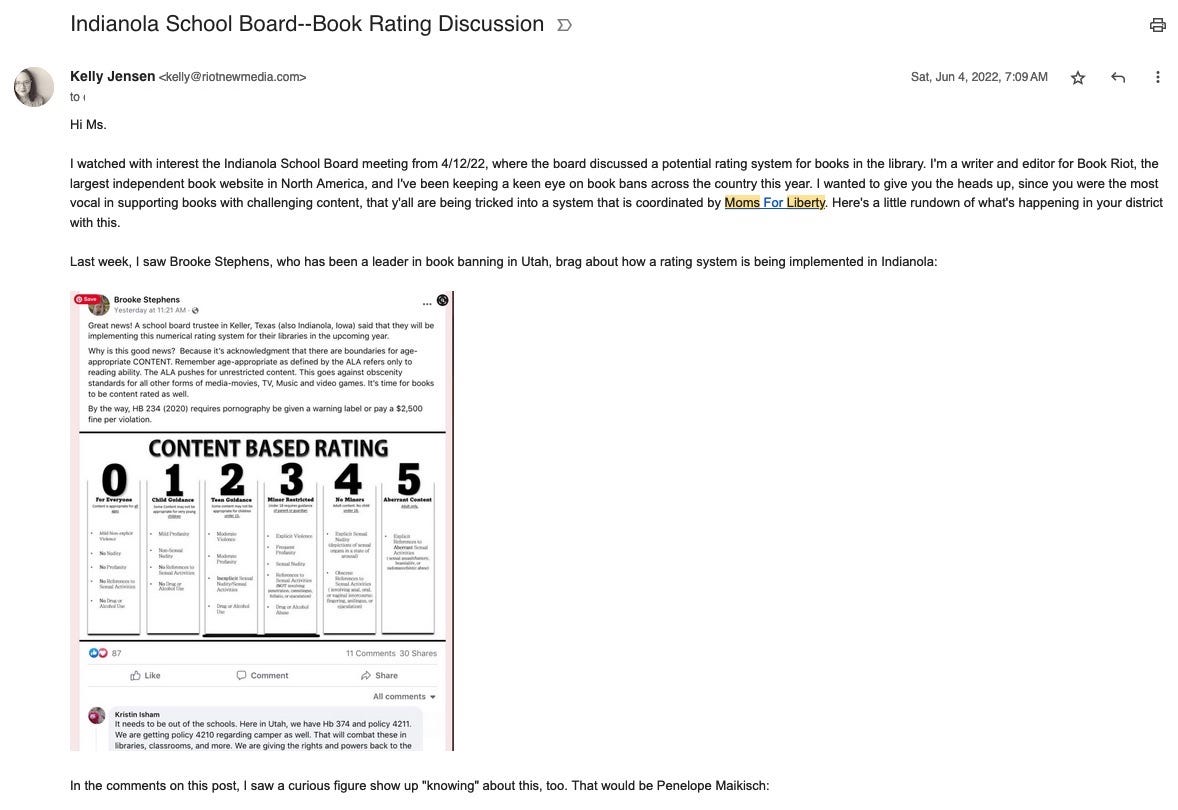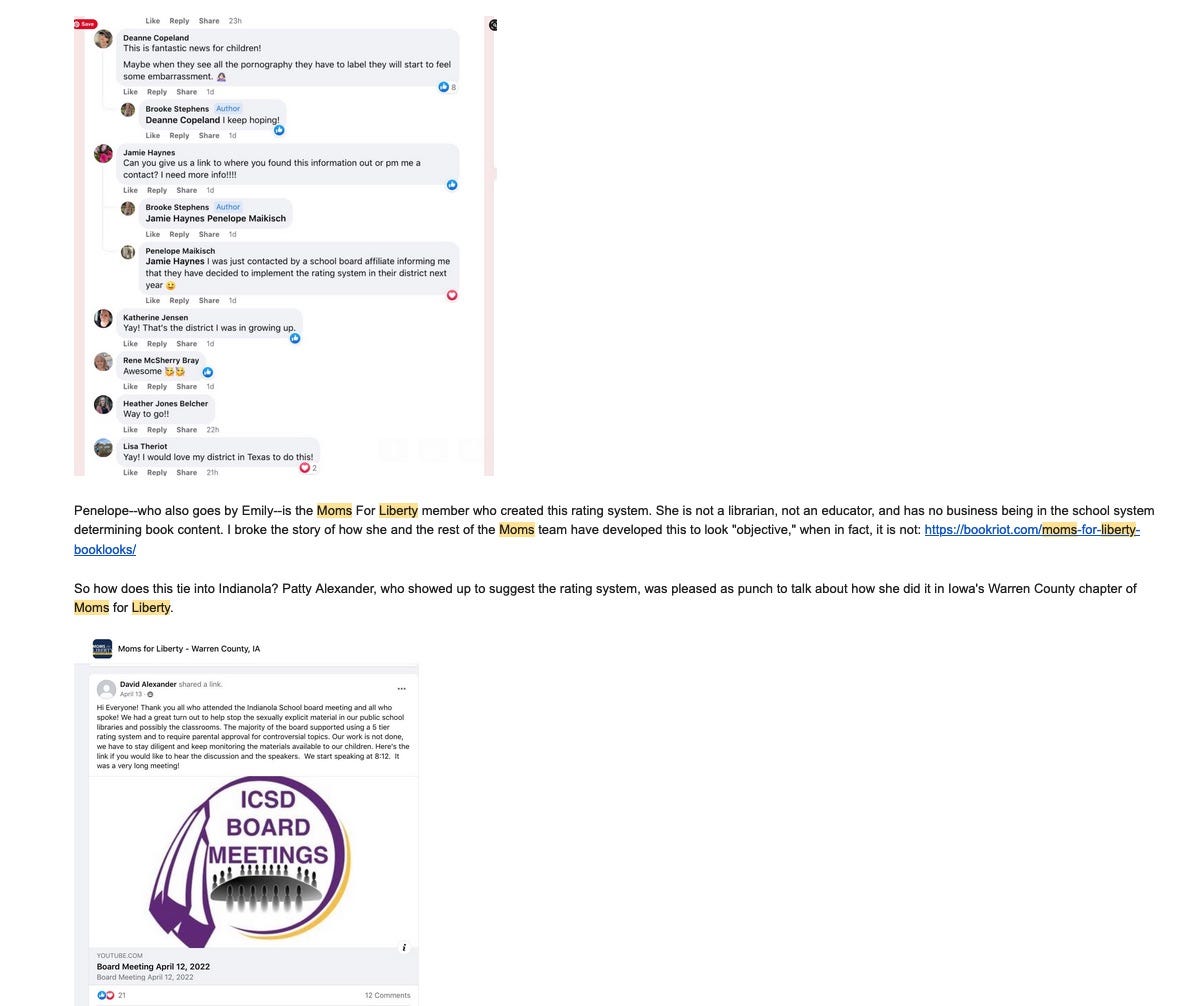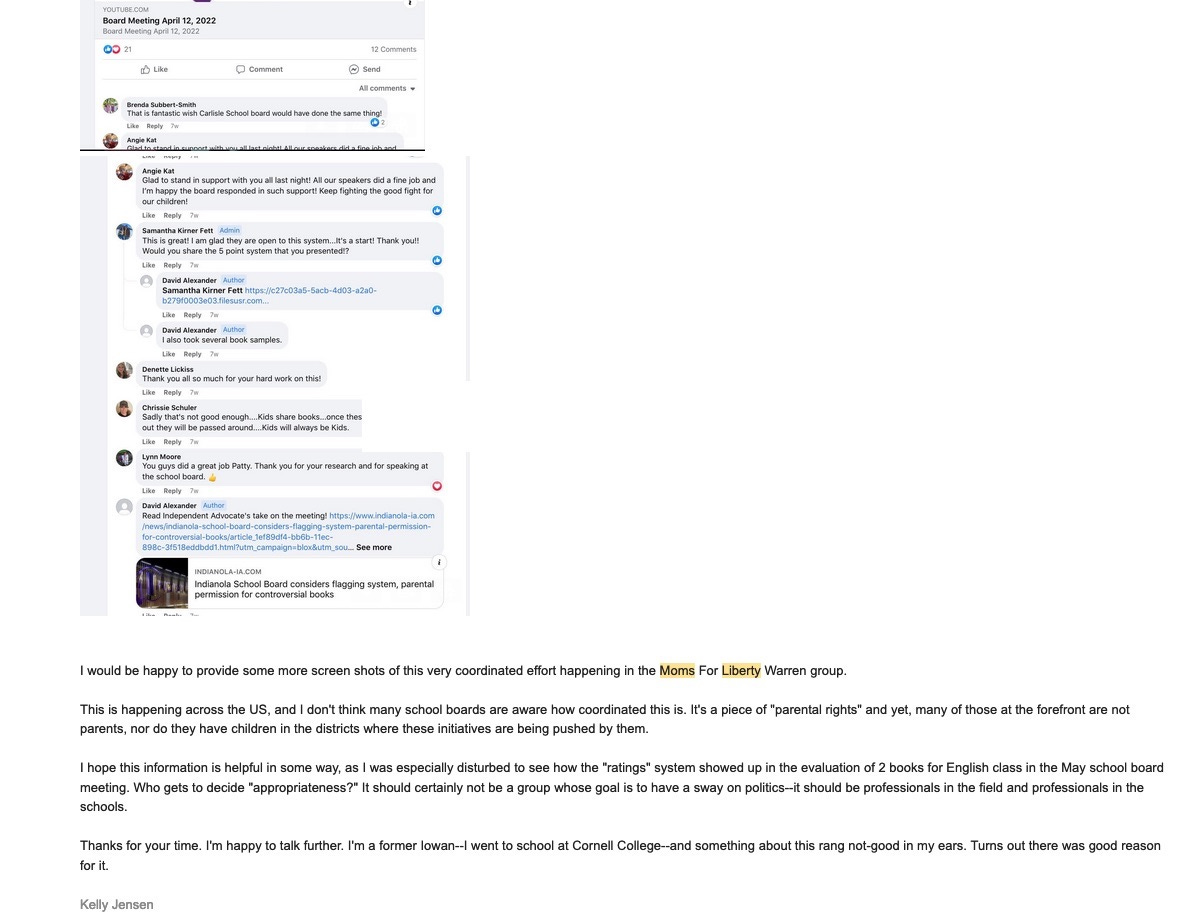One of the most common refrains from those aiming to ban books–and this comes not just from Moms for Liberty or No Left Turn in Education*, but also all of the local groups and individuals working to get rid of books on school and library shelves–is that they are not banning books. They insist their work is about simply “removing” books from the schools, not banning them. Of course, what they are doing is precisely that: banning books.
Dr. Emily Knox explains book censorship through four Rs. There's relocation, which is when you move a book out of where it has been initially placed and into another. An example would be moving a picture book about bodies from the children’s section of the library into the adult section or into a section of “parent resource” books. Then there’s redaction. This is a common tool used everyday to protect privacy. If you submit a FOIA request, for example, it is likely there will be redaction of personally identifying information, particularly of those outside the organization being FOIAd. Redaction has a long history with book censorship, too. You might see passages blacked out in a book or there are clever changes made to illustrations that obscure what some might find “inappropriate.”
The next two Rs are restrictions–this is where permission is needed to borrow or access materials–and then removal, or getting rid of the item in question all together. Though all four of the Rs have been in play during our recent wave of book censorship, it's these two which have been pushed the most. We’ve seen a host of opt-in and opt-out policies. Opt-in means permission is needed prior to accessing materials while opt-out means material is available but the option is there to withhold it. Both types of policies have been implemented across the country, and most of the response is not enthusiastic. Parents mostly do not care to dictate what their children have access to at their schools or libraries. Part of it is trust, and the other part is that these parents understand they have the responsibility to teach their kids what is and is not appropriate.
And truly, even with the rhetoric around obscene material and pornography in schools, what parent thinks their kid is going to the library for porn when those same kids have access to whatever they want on their cell phones?
Back in February, I wrote about a 111 page Playbook written by the Polk County, Iowa, chapter of Moms for Liberty. This playbook outlined where and how Moms For Liberrty would be challenging materials, and it was distributed not only in Polk County, but across the country. Yes, Moms For Liberty operates on the county level, but they do so via the national organization. This is why if you see books being challenged in Brevard County, Florida–where Moms is headquartered–you know you’ll see those books being challenged elsewhere shortly thereafter.
Half-way through the booklet, the topic of The Bluest Eye comes up. It pulls the same few passages out of context via the group’s homegrown book review site, BookLooks, and then it includes a letter sent home to parents from a high school teacher. Morrison’s classic was being offered as one of the optional books for juniors at Johnston High School in Polk County to read as part of an upcoming unit.
What is not included in that part of the booklet is a whole page of the very letter the group uses as an example of how their rights are being trampled. Indeed, the page they left off is where they, as parents, are given the space to opt their children out of the lesson in exchange for an alternate assignment. It’s clever, isn’t it? Cherry picking what evidence supports your thesis and removing anything that doesn’t is truly the playbook. Your rights as a parent are indeed being infringed upon when you choose to have them interpreted that way. When you choose not to actually exercise the rights which have been there all along. When you pull out crucial context to a situation in order to cram it into the shape of your agenda.
The Playbook’s introduction sets the stage for what is turning out to be a constant argument that Moms for Liberty has to ward off:
Our group has been labeled “Book Banners”, which is patently false. We do not want to burn books or take them out of circulation. If a parent believes their child should have access to these materials, they can check them out at a public library or purchase it. We are simply asking that sexually explicit, vulgar, and/or obscene materials not be available within our public schools, where parents have diminished control of what their children can access or read.
Except, that is the definition of a book ban. A book ban, per PEN America, is “any action taken against a book based on its content and as a result of parent or community challenges, administrative decisions, or in response to direct or threatened action by lawmakers or other governmental officials, that leads to a previously accessible book being either completely removed from availability to students, or where access to a book is restricted or diminished. Diminished access is a form of censorship and has educational implications that extend beyond a title’s removal.” It’s that fourth R–removal–that defines a book ban.
Even if we were to take Moms For Liberty at face value and not see their demands to have books removed from school library and classroom shelves as a book ban, the argument falls apart when they explain that “If a parent believes their child should have access to these materials, they can check them out at a public library or purchase it.”
This year, book fairs have been under attack from parental rights activists. These book fairs, which are often school fundraisers, have become attacked for the materials being made available within them. But isn’t this what groups like Moms For Liberty say that they want? They do not want kids to have access to these books in their school libraries and classrooms, and that parents who believe their kids should access those books can simply buy them. Except not really. They don’t want those books available to buy at the book fairs, unless those book fairs are being produced by right-wing publishers like Brave Books or the newly forced SkyTree. Book fairs which only sell the kinds of books with which this small group of far-right parents are okay. Others are not.
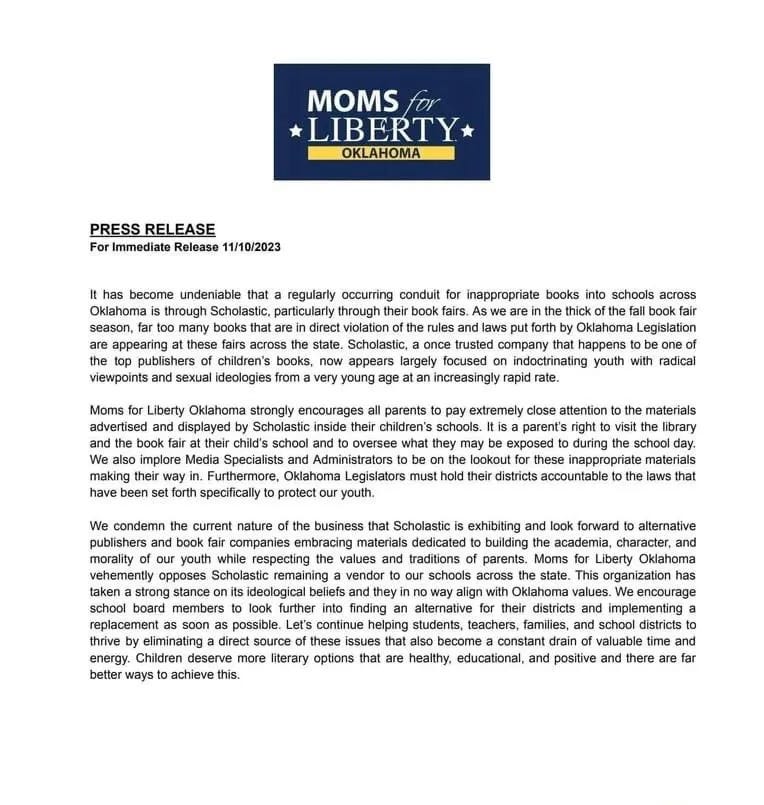
Of course, this isn’t a book ban, either. By demanding an end to book fairs outside of those approved by these righteous moralists, they are not infringing on the rights of parents or children to access books they disagree with. They just do not want those books to be “prominently” displayed in schools as part of a book fair. The kids can still get the books at their public libraries or private bookstores.
Except, public libraries are being defunded. Public libraries are having books challenged and banned, and they’re frequently the same books that are targeted in the public schools they serve. The larger assumption that young people have access to a library is in and of itself concerning. What children get to benefit from books being removed from their schools because they can simply get it at the local public library? In my years working in public libraries, I can tell you which kids those are and which ones those are not.
Rather than fighting to ensure access to these facilities, including funding and policies that allows all kids to get a public library card automatically or transportation to get kids to and from public libraries if it is not right in their neighborhood, groups like Moms have made it their mission to further disenfranchise the kids hurt most by their work.
But removing books from the schools is not a book ban.
It’s not a book ban when those same books are removed from public libraries either because people can buy them.
Here we return to the same argument. Buying the books solves the problem. The ability to buy the books is why removing them is not actually a book ban. It’s not worth the energy to explain capitalism here, nor is it worth the energy to talk about how children do not have access to debit or credit cards to purchase books from online retailers without parental permission nor is it worth the energy to explain that book prices continue to increase, particularly in YA, the category seeing tremendous book bans, making them further inaccessible to their target readership. It’s not worth bringing up that not every community has a bookstore or a proto bookstore in the form of Walmart or Target or Meijer. What is worth addressing is that book stores themselves have also been threatened.
It is amazing how dedicated to the cause of changing their brand from book banners to book removers is. Moms For Liberty in Warren County shared a curious new website called It’s Not A Book Ban. Go check it out–it’s a look at why the “work” being done by Moms For Liberty is not banning books. The site, which began either through the work of this particular chapter of Moms for another in the state (perhaps its neighbors in Polk, who developed the above-mentioned Playbook), claims that they aren’t book banners because they’re simply following the Iowa law. But the law in Iowa did not go into effect until May 2023, following the group’s urging of it through state governor Kim Reynolds.**
So what exactly were they doing in the prior months and prior year to year and a half when it came to “removing” books? Turns out, nothing changed except that they got the government to ram through one of the most overreaching, vague laws that encourages the removal–indeed, removal of and not banning of–books across the state. Any book depicting a “sex act” is subject to removal from schools in the state (see how Marshalltown Public Schools handled this and ask yourself if the district was being ghoulish for using AI or being as smart as they could given the law itself). The group behind the new It’s Not A Book Ban website have claimed situations of malicious compliance for districts who have removed titles not specified by the law…yet, the law itself is purposefully vague and misleading so that no matter what a district does, they are out of compliance, whether it’s “maliciously” or not.^
Wild, the website does not address where and how their group and friends of their group like Governor Reynolds have maliciously interpreted the very clear Miller Test for obscenity. Indeed, they themselves are the victims. They’ve been targeted for “just asking questions” and for “wanting to protect the children.” They’ve been targeted for purposefully cherry picking passages for their website BookLooks–they cannot help if districts are using that to ban books since, you know, they cannot control who access this freely available information that they themselves are pushing into school boards–and indeed, for not including the entire letter sent to them that outlines their rights as parents when it comes to classroom curriculum.
None of those things would fit their narrative.
What fits the narrative is that the very website claiming that book removal is not the same as a book ban shares “reviews” from Moms For Liberty’s BookLooks. Why? In order to make it clear these books are dirty and naughty and need to be removed from public schools as soon as possible. If children** even walked by a book like Not That Bad: Dispatches from Rape Culture, the book might jump off the shelf and into their hands, causing irreversible damage. They have successfully depicted a book about the realities of our contemporary rape culture into several pages of cherrypicked passages depicting horrific things–sure, rape is cheery and fun and would never involve raw, emotionally-challenging descriptions or experiences!–and a count of the naughty words in the book.
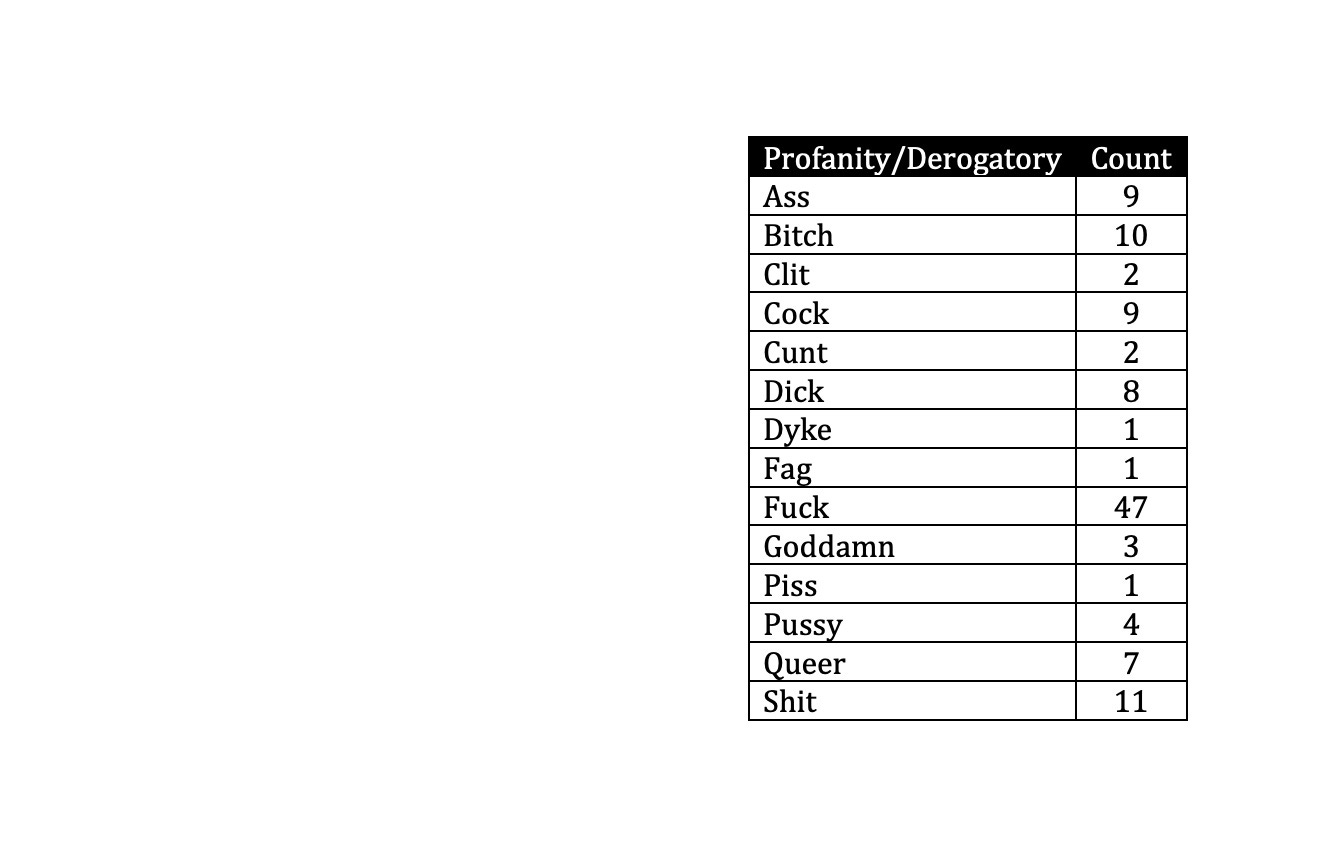
Moms know better than you when it comes to what books your students have access to. They know better than the educators and librarians and booksellers, too. They are the most righteous ones, with tremendous power, money, and time behind them. Yet, they have put so much effort into rebranding what it is they’re doing. It’s not book banning. It’s book removal, and those are two different things–according to them.
But it doesn’t take a lot of work to understand that their differentiation of meaning between a book removal and a book ban isn’t a difference at all. Indeed, it’s pretty much like what we have seen happening in board rooms across the country. Looking at anything in isolation can make for a compelling case with the right rhetoric and right performance and right set of examples pulled out to highlight. Indeed, when committees have read the books being challenged as a whole, it is more often than not those books never leave the school shelves (schools in Maine are a great example of this, as is this example out of South Carolina).
It’s almost as if when you read the book, you understand it has a purpose and that the context is crucial to understanding what that purpose is.
For a cadre of book banners, rebranding is one more way they attempt to decontextualize what they’re doing. Even their website voids itself of any context of who is demanding to be seen as a remover, vs. a banner. You only ever know if you use your own time and energy to do the research.
That is precisely what they don’t want you to do.
Notes:
*Because Moms For Liberty is so social media savvy and friendly, they have become the stand-in for all of the groups working to ban books, ram through anti-trans policies at the school district level, and right-wing nationalists aiming to dismantle and defund public institutions like schools and libraries. But it’s worth reemphasizing again and again that they aren’t alone, and they aren't even the biggest. This is important because the moment the focus is entirely on them, other groups who are far more destructive keep succeeding. Just look at Plano ISD and the Citizens Defending Freedom, who have successfully shifted policy in the district to get books removed (using Moms For Liberty’s BookLooks–which Moms denies is theirs because having their name affiliated with it is bad for its implementation as the group itself has a reputation the public is familiar with). It’s cool Levar Burton name checked Moms for Liberty, but how does that change the reality that they are but one of dozens of groups? It only makes them a singular target, rather than one symptom of a larger illness. You don’t get as many cool nicknames and memes from Citizens Defending Freedom or Clean Up (fill-in-the-name-of-the-city) or No Left Turn in Education or, or, or. Indeed, this is going to especially kick the asses of blue cities and states who consider themselves safe because at least they don’t have Moms For Liberty. They just have other groups and individuals managing to get through because even the most well-meaning folks in blue states don’t actually care about the issue and nuances of the issue. They’re just safe from Moms.
**There is a fascinating trend of pulling data together that conflates timelines when it comes to Moms for Liberty. Following the bonkers federal-level hearing on book bans by the Committee on Education and the Workforce came this news release. “This media coverage paints an inverse picture of the actual influence these groups wield. On one hand, PEN receives $29.1 million in revenue and has $36.8 million in assets, and on the other, Moms for Liberty has a paltry $370,000 in revenue and $207,000 in assets, all stats according to 2021 tax filings” How convenient to compare an organization which has been around since 1922 with an organization that incorporated in January 2021–Moms’s 2021 tax filings would be their income and assets in 2020, which is the year prior to their official incorporation. How clever to do that, leaving out some vital context.
***There is an entire essay to be written about how book banners have effectively utilized words to create specific impact, especially when it comes to describing who it is they are protecting from the naughty books. Rarely do they say teenagers, but they sure do use children frequently, especially when describing people who are older teenagers. This sort of language is powerful not only for their arguments, but it’s a reminder of how they as adults want to wield their sense of power over young people who are close to becoming full grown, independent adults themselves.
^ In late spring 2022, I watched several board meetings of the Indianola Public Schools in Iowa. Why? Because I got wind of Moms trying to get BookLooks used as the professional review source for district materials. Indianola is in Warren County–surprise, surprise–and note this all took place prior to the implementation of Iowa’s sex acts law. I couldn’t sit with the knowledge I had acquired, and I ended up reaching out to a member of that school board to tell them what was going on. I’m redacting her information, though her response was one of deep concern over the events she had not even been aware of happening (why would she?). I’m curious how Moms For Liberty can keep up the lies of only following the law when they were demanding book bans removals a year before it even came to be. You can read the letter below.


